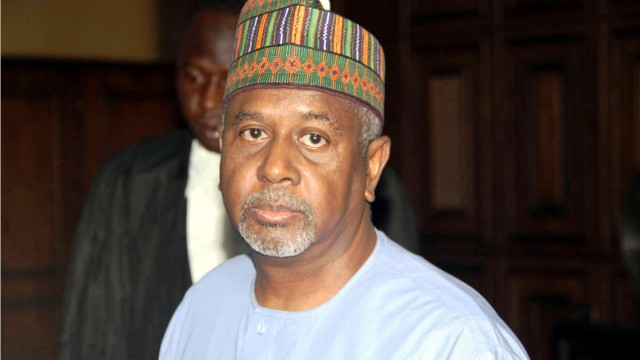Editorial
ECOWAS Court, FG And Dasuki

The long-drawn legal battle between the
Federal Government and the former
National Security Adviser (NSA) to former President Goodluck Jonathan, Col. Sambo Dasuki (rtd), over enforcement of the latter’s fundamental human rights finally went to the Economic Community of West African States (ECOWAS) Court which recently ordered his immediate release on bail.
Dasuki has been detained since November 3, 2015 after his arrest by operatives of the Economic and Financial Crimes Commission (EFCC) over an alleged $2.1 billion arms procurement deal.
Before the matter went to the ECOWAS Court in Abuja, the former NSA had practically exhausted all legal options in search of bail which when granted by each of the three high courts the anti-graft agency took him, was quickly annulled. For, no sooner had he been granted bail and released from the Kuje Prisons in Abuja on December 29, was he re-arrested by operatives of the Department of State Services (DSS), thus, making a mockery of the courts.
All parties to the matter, including the Federal Government, Attorney General of the Federation and the Inspector General of Police (IGP), made legal representations before the sub-regional court not only ordered for Dasuki’s immediate release but also awarded him a N15 million cost against the Federal Government to cover for the deprivation of his right under Articles 5 and 6 of the African Charter on Citizens Rights to Freedom of Liberty.
The three-man panel of judges whose unanimous verdict was read by Justice Chijioke Nwoke also considered as ridiculous the claim by the Federal Government that Dasuki planned to stage a coup d’etat and possibly wage war against millions of his compatriots. Responding, the Federal Government, through the Attorney General, said it was still studying the ECOWAS Court’s ruling with a view to complying with its order and necessary provisions as applicable.
Given that it is now more than three weeks since the October 4 ruling granting Dasuki bail, The Tide frowns at the continued delay by the President Muhammadu Buhari-led Federal Government to obey this simple court order.
We think that Nigeria, under the current leadership, should not be seen by the international community as being above the law. Rather, the Federal Government must respect the Rule of Law and the independence of the judiciary which serves as a check on likely excesses of the executive arm.
Moreso, considering the critical role Nigeria played as a key founding and financial member of the ECOWAS, the country must not be seen as destroying a house she painstakingly helped to build over the decades.
Therefore, in the same manner, Nigeria complied with the ruling of the International Court of Justice at The Hague over the disputed oil-rich Bakassi Peninsular, no matter how unpalatable, she should continue to strive and ensure the existence and sustenance of ECOWAS and its organs.
The delay or outright disobedience of both municipal and international court orders by the Federal Government will not only dent Nigeria’s image but also scare foreign investments as investors may lose confidence in doing business in a lawless country.
Also worthy of mention is the case of Nnamdi Kanu, detained leader of the Indigenous People of Biafra (IPOB), who was equally granted bail by a court of competent jurisdiction and was reported to have met his bail conditions but still remains in detention. He, too, seems to be considering recourse to the ECOWAS Court.
Again, it beats our imagination that the Federal Government and its agencies would be quick to arraign any crime suspects and obey only favourable judgements but opt to foot-drag against unfavourable ones.
It is the contention of The Tide that Nigeria shall lose nothing in allowing Dasuki go on bail as directed by the ECOWAS Court pending determination of the substantive suit. Anything short of this, amounts to outright disobedience to court order and by extension, the rule of law which automatically interprets the case against the suspect as a product of witch-hunting which may be injurious to the nation’s nascent democracy.
Editorial
AFCON ’25: Bravo, Super Eagles, But…

Editorial
Fubara: Celebrating A Leader At 51

Editorial
Beyond Accessing Bonny By Road

-

 Politics4 days ago
Politics4 days agoPFN Rejects Call For INEC Chairman’s Removal Over Genocide Comments
-

 Rivers4 days ago
Rivers4 days agoFasthire, PHCCIMA, CIPM Host CareerFest 2026 In PH
-

 Sports4 days ago
Sports4 days agoEnekwechi wins Orlen Cup in season opener
-

 Politics4 days ago
Politics4 days agoHoodlums Disrupt LP-ADC Defection Event In Lagos
-

 Sports4 days ago
Sports4 days agoFalconets, Senegalese Lionesses arrive Ibadan for qualifier
-

 Sports4 days ago
Sports4 days agoSimba open Nwabali talks
-

 Politics4 days ago
Politics4 days agoRemoval From INEC’s Portal, Abure-Led LP Faction Mulls Legal Action
-

 Niger Delta4 days ago
Niger Delta4 days agoTinubu, Jonathan, Diri Pay Last Respect To Ewhrudjakpo

